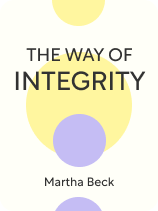

This article is an excerpt from the Shortform book guide to "The Way of Integrity" by Martha Beck. Shortform has the world's best summaries and analyses of books you should be reading.
Like this article? Sign up for a free trial here.
What is your true self? Is there something to intuition? How do you trust yourself?
Martha Beck argues that, at your deepest level of self, you know what will make you happy and what kind of life you want to lead. You also know how you feel and what is true about your own life. This deepest level of self is your personal nature.
Continue reading to learn more about Beck’s theory of identity.
What Is Your True Self?
What is your true self? Beck contends that your personal nature constitutes a sort of bedrock for your psychology and personality. You may experience your personal nature in the form of intuitions or deep personal yearnings or as a sense that something is “off” in your life when you stray too far from your nature.
| Is There a “True Self?” Many psychologists agree with Beck’s assertion that there is a core self that contains your true desires and goals in life—a “true self,” in other words. However, some psychologists have rejected this idea and consider it an ideal rather than a reality. Psychologists who reject the “true self” argue that what people think of as their “true selves” is in fact just who they want to be or feel they ought to be. It is an aspiration rather than a reality. They also cite research finding that people feel “authenticity” when they are accepted by others in a group setting, even if they are behaving contrary to how they would behave outside of that setting. This suggests that “authenticity” may have more to do with external validation than internal validation, paradoxically turning the concept of a “true self” on its head. Psychologists who support the existence of a “true self” highlight the painful experiences of hiding parts of ourselves for the sake of conformity, and the anguish caused by living out of alignment with core personal values. They assert that these experiences are painful because they contradict parts of ourselves that are either more important or more deeply held than other desires and motivations, suggesting the existence of either a “true self,” or something like it. Some psychologists also argue that a stable and consistent sense of an authentic self is an essential building block of healthy self-esteem. To believe that you have value, first you must believe there’s a you. |
Living in Accordance With Your Personal Nature
While each of us has a personal nature, our daily life is not always aligned with this nature. For example, you might spend your life locked into a routine, when your nature is more spontaneous, or you might spend your life in solitude when your nature is more sociable. Beck maintains that there are three core components to living in accordance with your personal nature.
- Accept your personal knowledge. All of us learn personal truths throughout the course of our lives through direct experience. You live in alignment when you accept these personal truths about your life, and you live out of alignment when you reject them.
- Accept your feelings. Each of us experiences natural emotional responses to the events of our lives. You are living in alignment when you allow yourself to fully experience these emotions and out of alignment when you repress or avoid them.
- Spend your time on what you love. How do you spend the moments of your day? When you spend your time doing things that you actually want to do, you are living in alignment with your nature. If you spend all your time doing what you feel you ought or have to do, then you are living out of alignment.
| How Do You Trust Yourself? Beck’s three points for living with integrity require you to have a sense of your true knowledge, feelings, and loves. If these things are in conflict with each other, how do you know which ones are really true to your nature? Unfortunately, there’s no external source of confirmation—no mathematical formula to prove that you would rather write a novel than work as an actuary. This forces you to rely on internal sources of confirmation—in other words, trusting yourself. To cultivate self-trust, psychologists argue you should view trusting yourself not as a permanent or achieved state, but as a process of trial and error. If you feel that there’s something you wanted to do or say but held back, give it a try and see how it feels. If it feels right, continue, otherwise try something else. Psychologists suggest that getting to know your true self is like getting to know anyone else—a relationship you build over time. |

———End of Preview———
Like what you just read? Read the rest of the world's best book summary and analysis of Martha Beck's "The Way of Integrity" at Shortform.
Here's what you'll find in our full The Way of Integrity summary:
- How to know if you're living in alignment with your true self
- How messages from our culture tell us to chase things we don't really want
- The four stages of realigning your life to find happiness






